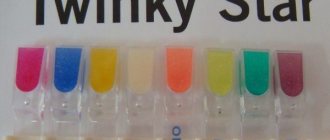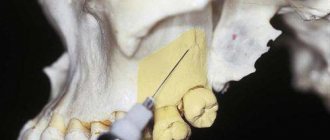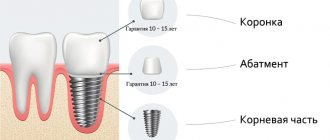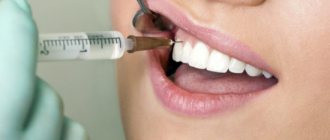Why does the patient not benefit from anesthesia during dental treatment?
Dental treatment always becomes stressful for a person, so experts have developed anesthesia.
But there are times when pain relief does not work. In our review, we will look in detail at the culprits of such circumstances and tell you what to do. Anesthesia doesn't work - why?
What is anesthesia
The procedure for administering special drugs, after which the patient loses sensitivity at the injection site, is anesthesia. The active substance blocks nerve impulses that transmit signals of irritation to the brain, resulting in no response from the body (pain). After the effect of the product is completed, the sensations return.
Depending on the surgical procedure, there are several types of local anesthesia.
- Applique. A drug is applied or sprayed onto the surface of the mucous membrane, which quickly provides pain relief. This procedure is necessary for patients with a low sensitivity threshold before the main injection.
- Infiltration. Reduces pain in a small area by blocking impulses at the level of branch nerves. The drug is injected into the root tip. Conductive. If the first two types of anesthesia do not have an effect on a person or you need to remove sensitivity in several teeth, then this method should be used. The entire nerve chain is blocked.
- Intraosseous. If during a serious surgical intervention you need to quickly numb a certain area, then this anesthesia is used. First, the gums are treated, and only then an injection is made into the spongy jaw layer of the bone.
- Intraligamentous. The drug is administered between the alveolar wall and the root, after which the sensitivity of the mucous membranes is maintained.
The dentist chooses the technique based on the amount of work and the degree of impact.
A person has a tooth removed or his gums are cut to extract pus: anesthesia eliminates discomfort during treatment, which is why it is used in all clinics and private offices.
Causes
Why doesn't anesthesia work? Patients have encountered a situation where a long time has passed after the injection, and “freezing” does not occur.
There are several culprits that cause blocking of nerve impulses.
A drug
Poor anesthesia does not work fully. The product may be expired or storage rules have been violated. When using the medicine, you must comply with the conditions stated in the instructions.
For each type of tooth there is a special method of administration and a separate composition.
Fat solubility and the ability to bind to proteins are the main properties that are responsible for blocking impulses.
Poor quality carpule anesthetic
The effectiveness of the drug also depends on its concentration. An incorrectly selected dose always negatively affects processes in the human body. Sometimes the doctor makes a mistake in the injection technique, so the medicine does not get to the right place. The needle breaks, leaving a wide channel. The disrupted structure of the mucous membrane allows the drug to leak out, which negatively affects the quality of anesthesia.
Regular use of one drug makes the body less susceptible to its effects. If the anesthesia is not changed for several years, then the body adapts to it. Often the doctor has to give additional injections for the first manifestations of “freezing” to begin.
Alcohol
Alcohol and drugs are the scourge of our time. But in addition to the main destructive activity, bad habits worsen the quality of anesthesia, making the nerve fibers insensitive to the action of the drugs. If there is intoxicant in the blood, you need to increase the dose of anesthesia.
Alcohol is prohibited before treatment
In case of acute intoxication, dental treatment is generally prohibited.
At the chemical level, drinking blocks the action of the anesthetic, preserving pain impulses. Chronic alcoholics are not helped at all by even the most expensive drug.
Fear
Fear of any manipulation in the oral cavity causes the body to produce adrenaline. The adrenal glands work overtime, producing stress hormones. Once in the blood, the substance increases blood pressure, therefore the heart rate increases and spasms of small vessels begin. The drug cannot penetrate the nerve fiber.
Fear of dental treatment makes you endure pain
Such patients endure terrible toothache for months just to avoid going to the dentist. Fear and panic grip a person sitting in a chair and watching the doctor’s manipulations.
The specialist makes several injections, but the body does not accept the anesthetic.
Patients do not have primary signs of pain relief (numbness of the gums, lips, cheeks), and a sharp spasm is observed with any touch.
Physical characteristics of the patient
All people are individual. Excess weight, the presence of a particular disease, the structure of nerve fibers - the quality of treatment depends on all these factors. The dentist may not be able to reach the desired area due to the non-standard placement of the endings.
Ehlers-Danlos syndrome is a rare genetic disorder that affects the muscles, skin and skeleton. The disease has made patients more resistant to injections, so the doctor needs to choose the right dose to “freeze” the gum area. Often the procedure is accompanied by several injections.
Physical characteristics of the body - insensitivity to anesthesia
In case of severe inflammation, the drug also does not work. Acidity increases in the body, so local remedies are poorly absorbed. If ulcers or gumboils appear due to dental problems, then first of all they get rid of the infections, and then treat the teeth.
Scientists have noticed that people with red hair and fair skin often experience pain after using local anesthesia. The culprit for this was the melanocortin-1 gene, which, due to a mutation, made the body of golden-haired patients more resistant to the effects of anesthetic drugs.
A long course of treatment with certain medications also reduces the quality of pain relief. It is difficult for the liver to cope with the increased load, so the body will perceive the new substance in its own way.
What to do?
Dental treatment is an important procedure for which you must prepare.
If a patient experiences panic before each visit to the dentist, then a week before treatment we recommend taking mild sedatives.
The drug "Afabazol" has a positive effect on the nervous system after 48 hours. It is better to take valerian and motherwort in tablets, since tinctures contain alcohol, which reduces the quality of anesthesia.
Remember: you should tell your doctor about all medications.
“If a patient has a phobia of dental treatment, he is advised to drink soothing teas with chamomile or lemon balm at night (before going to bed."
What to do if your tooth hurts unexpectedly and there is no time for a “soothing” course? The drug "Tenoten" improves well-being and relieves anxiety. A person in an excellent mood goes to the dentist and does not experience the primal horror of visiting the clinic. Unlike tranquilizers, the medicine does not impair the quality of memory and does not leave unpleasant sensations in the body.
Melissa tea has a calming effect
After a long course of therapy, we recommend taking medications for liver regeneration.
In this case, you will protect an important organ and protect yourself from complications. Colds and flu are also undesirable diseases, so we advise you not to visit the dentist until you have completely recovered. Be sure to tell the specialist about all diseases.
Do not drink alcohol-containing drinks at least one day before treatment. Alcohol is eliminated from the body within 72 hours, but breakdown products remain for another week. To speed up the breakdown, you need to cleanse the body. Doctors recommend drinking sorbent preparations and also using succinic acid.
“In some adults, the bone in the frontal region of the lower jaw is impermeable to the anesthetic. What is the way out of this situation? Again, digital redistribution of the anesthetic at the mental foramen or conduction blockade of the mandibular nerve.”
Impermeable zone in the lower jaw for anesthetic
To protect yourself from unqualified dental care, you should always choose a clinic or office with an excellent reputation.
High cost is not an indicator of professionalism. It is better to find “your” doctor who you can trust. Psychologists say that many patients prefer to be treated by one dentist.
Toothache often causes discomfort in a person, but the fear that the anesthesia will not work repels people from timely treatment. Our recommendations will help you find the cause of the failure, and it is better to entrust the therapy to specialists.
Source: //zubnoimir.ru/zuby/pochemu-ne-dejstvuet-anesteziya-pri-lechenii-zubov.html
Substances that interfere with pain relief
If they are afraid of dental treatment, some patients drink alcohol before going to the dentist. This is beyond wrong. This “sedative” technique does not bring any effect, but, on the contrary, interferes with the effect of pain relief.
If you drink before anesthesia, alcohol will only interfere with the anesthesia.
If there is alcohol in the patient's blood, the anesthetic does not work well. Sometimes a larger dose of pain medication is needed. But often the effect of anesthesia does not occur at all. Alcohol makes nerve fibers insensitive to injected drugs. In chronic alcoholics, it is sometimes almost impossible to numb the teeth.
Drugs have the same effect as alcohol, so taking them before dental treatment is also prohibited.
The effectiveness of anesthesia depends on the quality of the injected drug, the skill of the dentist and the characteristics of the patient’s body. One of the main factors that interfere with pain relief is fear. Because of this, the adrenal glands produce adrenaline, which, by constricting the blood vessels, prevents the anesthetic from numbing the required area of the oral cavity. It is also not recommended to consume alcohol or drugs before visiting the dentist. If you have a pronounced fear of the dentist, you can drink tea with mint or lemon balm the night before bed, as well as sedative pills, having previously discussed the possibility of taking them with your dentist.
When anesthesia does not work during tooth extraction
Thanks to anesthesia, dental treatment became almost painless. Anesthesia helps the dentist carry out types of treatment of teeth and oral tissues of varying complexity and duration. But there are cases when the administered drug does not “take” the patient.
What is anesthesia
The procedure for administering special drugs, after which the patient loses sensitivity at the injection site, is anesthesia.
The active substance blocks nerve impulses that transmit signals of irritation to the brain, resulting in no response from the body (pain). After the effect of the product is completed, the sensations return.
A person has a tooth removed or his gums are cut to extract pus: anesthesia eliminates discomfort during treatment, which is why it is used in all clinics and private offices.
Reasons for ineffective anesthesia
There are many reasons why anesthesia does not work for dental treatment. In order to understand why it does not help in the case of a particular patient, an individual approach is needed.
In individual cases, anesthesia does not work.
Below are the main reasons why local anesthesia does not work:
- Poor quality anesthetic agent. The anesthetic may be expired or it may have been stored incorrectly. The instructions for each drug clearly state the expiration date and storage rules. If at least one of these conditions is not met, the patient will say during dental treatment that the pain relief does not “take” him.
- Incorrect amount of anesthesia drug. If the doses are insufficient, the anesthetic simply will not be able to act and numb the teeth and oral tissues.
- The dentist chooses the wrong drug for dental anesthesia. The anesthetic is selected depending on the technique of its administration and the expected purpose.
- Violation of the integrity of the oral mucosa at the site of the administered anesthetic. In this case, the painkiller may leak out before it has time to take effect. Sometimes this happens due to an incorrectly selected injection needle. It injures the mucous membrane, leaving behind a wide channel.
- Individual anatomical features of the patient. All people are individual, nerve fibers also have their own structural and location features. The doctor may not be able to reach the area where the desired nerve fiber passes, and the anesthesia will not work.
- An inflammatory process in the soft tissues where the anesthetic is injected. Most often this occurs with periodontitis, when a fistula appears on the gum through which pus comes out, or during an inflammatory process in the gum itself. Typically, a dentist, seeing such a problem, chooses alternative methods of administering the medicine without affecting the area of inflammation. Pus, in contact with the anesthetic, changes its pH and neutralizes its effect by destroying the chemical structure.
- The psychological state of the patient or the patient's use of certain substances before treatment. This will be discussed in more detail in the next part of the article.
Recommendations before visiting the dentist
Dental treatment is an important procedure for which you must prepare.
If a patient experiences panic before each visit to the dentist, then a week before treatment we recommend taking mild sedatives. The drug "Afabazol" has a positive effect on the nervous system after 48 hours. It is better to take valerian and motherwort in tablets, since tinctures contain alcohol, which reduces the quality of anesthesia.
Remember: you should tell your doctor about all medications.
“If a patient has a phobia of dental treatment, he is advised to drink soothing teas with chamomile or lemon balm at night (before going to bed." What to do if your tooth hurts unexpectedly and there is no time for a “soothing” course? The drug "Tenoten" improves well-being and relieves anxiety.
A person in an excellent mood goes to the dentist and does not experience the primal horror of visiting the clinic. Unlike tranquilizers, the medicine does not impair the quality of memory and does not leave unpleasant sensations in the body.
Tea with lemon balm has a calming effect. After a long course of therapy, we recommend taking medications for liver regeneration. In this case, you will protect an important organ and protect yourself from complications. Colds and flu are also undesirable diseases, so we advise you not to visit the dentist until you have completely recovered.
Be sure to tell the specialist about all diseases.
Do not drink alcohol-containing drinks at least one day before treatment. Alcohol is eliminated from the body within 72 hours, but breakdown products remain for another week. To speed up the breakdown, you need to cleanse the body. Doctors recommend drinking sorbent preparations and also using succinic acid.
“In some adults, the bone in the frontal region of the lower jaw is impermeable to the anesthetic. What is the way out of this situation? Again, digital redistribution of the anesthetic at the mental foramen or conduction blockade of the mandibular nerve.” Impermeable zone in the lower jaw for anesthetic
To protect yourself from unqualified dental care, you should always choose a clinic or office with an excellent reputation. High cost is not an indicator of professionalism. It is better to find “your” doctor who you can trust.
Psychologists say that many patients prefer to be treated by one dentist. Toothache often causes discomfort in a person, but the fear that the anesthesia will not work repels people from timely treatment. Our recommendations will help you find the cause of the failure, and it is better to entrust the therapy to specialists.
Source: //ZubyBest.ru/vidy-udaleniya-zubov/anesteziya-pri-udalenii-zubov/kogda-anesteziya-ne-dejstvuet-pri-udalenii-zubov.html
If there is pain after dental treatment
In this case, complications are to blame:
- hematoma is a tumor that appears at the injection site. If a large vessel is damaged, it may spill. When an infection occurs, suppuration of the hematoma occurs - a serious complication of dental treatment, life-threatening;
- a piece of the needle broke off, remaining inside the jaw tissue. This complication almost never occurs now, since the disposable instrument practically does not break. If this happens, it is possible that the clinic you went to uses a cheap medical instrument. Think about whether it is worth getting treatment in such a place;
- temporary paresis of the facial nerve - the complication goes away on its own without treatment;
- allergic reaction - usually occurs when a new drug is first administered. To avoid getting into such a dangerous situation, tell your doctor about your allergic predisposition.
In most cases, all problems with anesthesia can be easily resolved. To do this, additional injections are given or treatment is postponed to another day.
Category: Tooth extraction Published by Mister stomatolog
Why does anesthesia not work for me during dental treatment?
52 replies
Latest - October 3, 2020, 11:19 am Go
Guest
Well *****, why wait until pulpitis forms? In such cases, yes, it can be painful, even with anesthesia.
Guest
I have pulpitis...
Guest
I have pulpitis...
Guest
I don’t know, everything always works for me. Yesterday I had my wisdom teeth pulled out, I didn’t feel anything at all, just a crunching sound!
Guest
Well, you yourself answered your own question, why anesthesia does not take you. Visit your dentist more often.
Red Dachshund
Have you ever had pulpitis? Everyone I know has felt pain with this problem, even with anesthesia. But the intensity of the pain depends on what anesthetic is used, and whether the doctor’s hand is growing from the right place.
Elena, have you been injected with carpule anesthetics (Ultracaine, Septanest, Ubistezin)? Conduction anesthesia (The anesthetic solution passes directly to the fibers of the branches of the trigeminal nerve.
At the same time, it is blocked and anesthesia is achieved in the area that it innervates) and practically relieves pain - maybe your dentist is just “hands out of the butt”?
Guest
in other cases, when there was tiny caries, it was still terribly painful... And now my tooth hurts under a recently placed filling, which is why I think that I have pulpitis,
Guest
in other cases, when there was tiny caries, it was still terribly painful... And now my tooth hurts under a recently placed filling, which is why I think that I have pulpitis,
Guest
What is the difference between infiltration anesthesia and conduction anesthesia? (so that I can determine which one is being done to me) It seems that the doctor’s hands are actually from ... experience
Sarah Baraboo
Author, are you by any chance a redhead or a natural blonde with completely blond hair? I heard that this happens to them, anesthesia does not take effect, something is connected with linked genes - reduced pigmentation and reduced sensitivity to anesthetics often go together.
But it doesn’t happen that you don’t take any substances at all, warn the doctor about your peculiarities, maybe lidocaine doesn’t take, but another substance will. Well, don’t let it get to the point of pulpitis when caries begins to appear - so go ahead and see a doctor. I generally treat teeth without anesthesia and there is practically no pain - because I don’t end up with completely rotten stumps in my mouth.
And initial and intermediate caries are treated painlessly and without an anesthetic injection. This number will not work with deep caries.
Sarah Baraboo
. And initial and intermediate caries are treated painlessly and without an anesthetic injection. This number will not work with deep caries.
Guest
and it doesn’t bother me, on Tuesday I go to the dentist and am simply terrified. Anesthesia does not take a lifetime, small caries or pulpitis hurts
Red Dachshund
Have you ever had pulpitis? Everyone I know has felt pain with this problem, even with anesthesia. But the intensity of the pain depends on what anesthetic is used, and whether the doctor’s hand is growing from the right place.
Elena, have you been injected with carpule anesthetics (Ultracaine, Septanest, Ubistezin)? Conduction anesthesia (The anesthetic solution passes directly to the fibers of the branches of the trigeminal nerve.
At the same time, it is blocked and anesthesia is achieved in the area that it innervates) and practically relieves pain - maybe your dentist is just “hands out of the butt”?
guest
I am a dentist. Whether it hurts or not depends on the individual sensitivity threshold. Next, anesthesia works differently for everyone. There is a small category of patients for whom it does not work well.
Perhaps due to individual anatomical characteristics, perhaps chemical processes occur differently. Definitely, in case of acute inflammation, anesthesia will work worse in any person.
Try looking for a doctor who treats with sedation (pills or IV). Unfortunately, this is not very popular in the CIS countries.
New themes
Valentina
Today we had five injections, the molar has a three-canal tooth. I thought I was going to die. Anesthesia does not take effect. They drilled a hole, put anesthesia granules and temporarily covered it up. And the main thing is that my cheek has no pain, my tongue too, but I feel pulpitis. They tried to inject directly into the pulpitis, but if they touched it with a needle the pain was terrible. Then they soldered me something. I came home all in tears.
Elena
No matter how many times I have treated my teeth, it always hurts terribly. No matter how many injections are given, half of the head will go numb, and the taps will begin to drill. I was treated in both free clinics and paid clinics, having paid quite a bit of money... Now my tooth hurts, but I can’t bring myself to go to the doctor, I’m sweating with horror. Who else has this? Is it really impossible to completely anesthetize a tooth in the 21st century?(((
Elena
No matter how many times I have treated my teeth, it always hurts terribly. No matter how many injections are given, half of the head will go numb, and the taps will begin to drill. I was treated in both free clinics and paid clinics, having paid quite a bit of money... Now my tooth hurts, but I can’t bring myself to go to the doctor, I’m sweating with horror. Who else has this? Is it really impossible to completely anesthetize a tooth in the 21st century?(((
Elena
No matter how many times I have treated my teeth, it always hurts terribly. No matter how many injections are given, half of the head will go numb, and the taps will begin to drill. I was treated in both free clinics and paid clinics, having paid quite a bit of money... Now my tooth hurts, but I can’t bring myself to go to the doctor, I’m sweating with horror. Who else has this? Is it really impossible to completely anesthetize a tooth in the 21st century?(((
Source: //www.woman.ru/health/medley7/thread/4430198/
Incorrect needle direction during anesthesia
The ineffectiveness of local anesthesia, caused by inaccurate direction of the needle to the desired area (target) of the dental system, is quite common in the practice of a dentist, in particular when performing conduction anesthesia. Usually the main reasons for this are ignorance of topographic anatomy, which leads to inaccurate determination of anatomical landmarks, as well as a lack of practical skills in implementing one or another method of blockade. To this is often added the atypical structure of the jaw or bone or other anatomical features of the patient.
Here's an example. The doctor often does not take into account the significant divergence of the lower jaw, and therefore the injection needle can move 2.5 mm away from the given “route” without reaching the bone. To properly perform anesthesia, the needle must be pulled back a little, and then the body of the syringe located on the opposite side of the jaw must be moved towards the molars and only from this position the needle must be inserted in the direction of the bone. Having learned the anatomy of the jaws, you will understand what mistakes were made and will be able to answer the question, “ why does anesthesia not work on the tooth ?”
Recently, the number of cases of ineffective anesthesia due to inaccurate needle guidance has increased significantly. This is explained by the fact that the new generation of needles are very thin and with some methods of anesthesia, for example, torus, it is difficult for them to reach the target. Because while moving through the tissues, a thin needle, encountering dense obstacles (muscles, tendons, fascia, etc.), bypasses them, deviating more or less from the given direction.
It has already been proven that the thinner the needle, the greater its deviation from the planned “route”. Thus, needles with a thickness of 0.4 mm can move as much as 5 mm over an advance length of 20 mm. There are even more noticeable deviations during torusal anesthesia, when the needle has to pass through the medial pterygoid muscle (up to 25 mm). Therefore, this type of pain relief was abandoned abroad.
Reasons for the ineffectiveness of anesthesia during dental treatment
Thanks to anesthesia, dental treatment became almost painless. Anesthesia helps the dentist carry out types of treatment of teeth and oral tissues of varying complexity and duration. But there are cases when the administered drug does not “take” the patient.
What affects the work and properties of an anesthetic
An anesthetic is a chemical substance. When it is introduced into the tissues of the body, various chemical processes occur. The body begins to react to foreign fluid in its tissues.
After the drug is administered, the substance begins to work in the tissues
In order to understand why anesthesia does not work, it is necessary to understand the factors that determine the work of the anesthetic in the tissues:
- Physical and chemical characteristics of the drug itself. Medicines used for anesthesia in dentistry differ in their chemical composition.
- The ability of the drug to dissolve in fats. Lipid solubility determines the time it takes for the drug to penetrate cell membranes and begin to act. The higher it is, the less time it takes for the desired effect of pain relief to occur.
- Ability to bind to proteins. This property is responsible for blocking the passage of nerve impulses.
- The quality of the drug itself.
- Amount and concentration of anesthetic administered. In order for the anesthetic to work, a certain dose and concentration is required, which is selected by the dentist individually for each patient.
- Anatomical features of the patient’s tissues, the presence of inflammation in them. For example, with a pronounced bacterial process, the injected drug may be neutralized by purulent contents and will not have an analgesic effect.
The influence of the patient's mood on the effectiveness of anesthesia
It is not known exactly why many people are afraid to treat their teeth in the presence of modern and effective methods of pain relief.
The panic and terrifying fear that grips a patient sitting in the dentist's chair is one of the most important reasons for the ineffectiveness of pain relief during dental treatment.
Such patients can walk for months and endure toothache, and seek medical dental care only when a purulent process develops in the tooth or gum. But not only inflammation and the presence of pus can reduce the effectiveness of local anesthesia.
Often anesthesia does not work due to a person’s fear of dental treatment
Fear is a protective reaction of the body. When feeling fear, the adrenal glands begin to produce the hormone adrenaline.
Once in the bloodstream, adrenaline increases arterial blood pressure, accelerates the heartbeat and spasms small blood vessels. Vasospasm is the main reason for the lack of effect of the anesthetic.
The injected substance cannot penetrate the nerve fiber. And as a result, tooth pain relief does not occur.
If a patient has a phobia of dental treatment, he is advised to drink soothing teas with chamomile or lemon balm at night (before bed).
Pharmacological sedatives are sometimes used, but the possibility of taking them should be discussed with your doctor, since some of them may interfere with the anesthetic's effect on the nerve fibers.
It is very important for the dentist to provide the patient with information that the more afraid he is of the dental treatment itself, the more painful he will be.
Substances that interfere with pain relief
If they are afraid of dental treatment, some patients drink alcohol before going to the dentist. This is beyond wrong. This “sedative” technique does not bring any effect, but, on the contrary, interferes with the effect of pain relief.
If you drink before anesthesia, alcohol will only interfere with the anesthesia.
If there is alcohol in the patient's blood, the anesthetic does not work well. Sometimes a larger dose of pain medication is needed. But often the effect of anesthesia does not occur at all. Alcohol makes nerve fibers insensitive to injected drugs. In chronic alcoholics, it is sometimes almost impossible to numb the teeth.
Drugs have the same effect as alcohol, so taking them before dental treatment is also prohibited.
The effectiveness of anesthesia depends on the quality of the injected drug, the skill of the dentist and the characteristics of the patient’s body. One of the main factors that interfere with pain relief is fear.
Because of this, the adrenal glands produce adrenaline, which, by constricting the blood vessels, prevents the anesthetic from numbing the required area of the oral cavity. It is also not recommended to consume alcohol or drugs before visiting the dentist.
If you have a pronounced fear of the dentist, you can drink tea with mint or lemon balm the night before bed, as well as sedative pills, having previously discussed the possibility of taking them with your dentist.
Source: //NarkoZzz.ru/stomatologiya/ne-dejstvuet-anesteziya-pri-lechenii-zubov.html
Reasons for the ineffectiveness of local anesthesia in acute inflammatory conditions
The effectiveness of anesthetics increases in an alkaline environment and decreases in an acidic environment. This is because anesthetics are used in the form of salts, and their anesthetic properties depend on the free bases. In turn, free bases can be formed only in an alkaline or neutral environment, while in an acidic environment (pH < 7) the release of these bases is practically impossible (anesthesia is either sharply weakened or absent).
The most common factors causing the ineffectiveness of local anesthesia in acute inflammatory conditions include:
- increased blood circulation in the area of inflammation (leads to rapid removal of anesthetics in anesthetic tissues)
- decreased tissue pH at the injection site
- morphological changes that occur in the axon of a nerve cell in the area of inflammation
- the action of prostaglandins and inflammatory mediators directly suppress the effect of the anesthetic on the nerve fiber.
Injection of an anesthetic into tissue with low pH (< 7), that is, in the presence of inflammatory conditions in acute pulpitis, periodontitis, osteomyelitis, prevents the diffusion of the free base and, of course, not only leads to an ineffective blockade, but also often causes an accompanying infection. Therefore, to treat a carious cavity in a tooth (pulpitis, periodontitis), it is advisable to use local drugs such as anestopulp, pulperil, polymyxin (Septodont), which relieve this process. These products are injected on a cotton ball into the carious cavity and covered with a temporary sealed bandage. But still, the most optimal option for solving the problem of pain relief in acute inflammatory conditions is the use of conduction blockade .
Why does anesthesia not work during dental treatment?
- Mon – Sat 09.30 – 21.00 Sun – 09.30 – 18.00
- Moscow, metro Polezhaevskaya, Marshala Zhukova Ave., 3
Dentistry Mon – Sat 09.30 – 21.00 Sun – 09.30 – 18.00 Dentistry Dentum Russia Moscow metro station Polezhaevskaya, Marshala Zhukova Ave., 3
Articles Why does anesthesia not work during dental treatment?
The use of pain relief relieves us of the fear of dental procedures. But unfortunately, in rare cases the anesthesia does not work. If this happens regularly in a patient, then you should understand the reasons for this phenomenon.
What is anesthesia?
The procedure for injecting special drugs aimed at eliminating local sensitivity is called anesthesia. The active substance of the anesthetic blocks the conduction of impulses from nerve endings to the brain, preventing the occurrence of pain in response to manipulations. After the anesthetic wears off, sensitivity is completely restored.
Today in dentistry there are several types of local anesthesia. The most commonly used anesthesia is an injection into the area of one tooth. Other methods are aimed at “switching off” the nerves of several teeth at once.
The anesthesia procedure allows you to avoid discomfort during dental procedures, which is why anesthesia is used everywhere during the treatment and extraction of teeth.
Reasons for the lack of effect of anesthesia
- Individual features of anatomy. The effect of the local anesthetic is ensured by its injection into a specific location near the nerves. However, there are people who have a non-standard structure and arrangement of nerves. In such situations, additional injections of anesthetic solution are required in other areas.
- Local inflammatory process. In the presence of infectious inflammation in the tissues, the pH level decreases, which indicates an increase in the acidity of the environment.
Under such conditions, the chemical structure of anesthetics is destroyed and their effect is neutralized. There are several solutions to this problem: preliminary therapy with antibacterial drugs or the use of alternative methods of pain relief that do not affect the area of inflammation (Gow-Gates anesthesia, intraosseous anesthesia, etc.). - Ehlers-Danlos syndrome. This is a genetic disease that affects the condition of the skin, bone tissue and muscles.
With this pathology, conventional anesthesia is not effective, and it is necessary to resort to the use of stronger drugs. In some cases, for high-quality pain relief, several injections are required at once. - Psychological state of the patient. With dental phobia (panic fear of dental treatment), the production of anxiety hormones that interfere with the action of anesthetics increases. People with this condition are advised to take sedatives before visiting the dentist.
- Red hair color. It is known that red hair is a consequence of a mutation in the melanocortin-1 gene, a change in which also reduces the effectiveness of local anesthesia.
- Poor quality anesthetic. If the storage rules for the drug are not followed and its expiration date expires, you may not expect any effect from the administration of the anesthetic.
Therefore, you should be responsible when choosing a doctor and a clinic where treatment will be carried out. - Insufficient amount of administered drug. If the dosage is incorrectly selected, the anesthetic will not be able to work effectively.
- Wrong choice of drug for pain relief. The anesthetic should be selected by the dentist depending on the method of anesthesia and the desired result.
- Violation of the integrity of the mucous membrane at the site of injection of the anesthetic. The solution will simply flow out of the tissue without having the desired effect. This can happen if you select an injection needle incorrectly, which will injure the mucous membrane, forming a wide channel behind it.
If pain relief is repeatedly unsuccessful during treatment or tooth extraction, the dentist will be able to determine the cause of the problem and select an alternative method of anesthesia.
How long does anesthesia last?
This question is in second place in popularity. No one wants to experience pain during the process of tooth extraction. The answer to the question - how long does anesthesia last after tooth extraction will depend on the drug that was used and its dosage.
Typically, the procedure at the dentist takes 30-40 minutes. And only after 2-3 hours the patient begins to feel aching pain if novocaine or lidocaine is used in the form of injections. These are some of the most powerful drugs in dentistry. But in any case, the selection of the drug occurs individually, depending on the patient’s tolerance. Some may have allergies, which is very dangerous.











